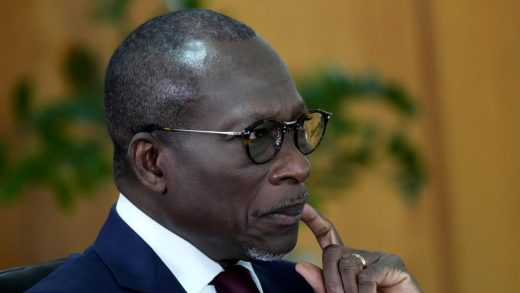CODE conference seeks to click on diversity, equity, inclusion

When the Winnipeg Chamber of Commerce launched its CODE initiative (Commitment to Opportunity, Diversity and Equity) in October 2021, it was not meant to be something that had a term limit.
At the third annual CODE conference Wednesday, Tina Chen, vice-provost, equity at the University of Manitoba (position newly created in September), reminded the 250 people in attendance that, along with other efforts expended in addressing that sort of commitment, patience must be part of the process.
Chen, who grew up in Edmonton and earned a PhD in Chinese history, said it’s important to remember for diversity, equity and inclusion (DEI) initiatives to be successful, a key part of the dynamic must be the notion of collective learning.
Ruth Bonneville / Free Press
Dr. Tina Chen, vice-provost (Equity) at the University of Manitoba, speaks at the RBC Convention Centre during the annual CODE Conference, Wednesday.
“We need to build relationships based on learning,” she said. “If we do that we will have the strength, knowledge and relationships to be able to work differently.”
Chen said it’s important for organizations to have a strategic vision about DEI rather than to treat it as a project. It won’t work if the thinking is: we’re going to bring an expert in to fix the wrong.
It may be a sobering consideration for some who may have hoped DEI was something to address and then move along on. During her remarks, Chen repeatedly referenced the importance of sustainability.
As president and CEO of the Winnipeg Chamber of Commerce, Loren Remillard is obviously sensitive to the outcomes chamber activities like CODE have on the local business community.
His vision of the CODE initiative is to provide a resource to assist and encourage members to embark on a journey, not a project with a scheduled end date. It is also about creating a road map for successful businesses.
“This is future-proofing organizations for success,” he said Wednesday. “By acknowledging and embracing diversity, not in a performative way, but in a substantive way — it will allow organizations to welcome people of all lived experiences to bring their authentic selves to the workplace.”
The fact Chen’s position is a new one at the University of Manitoba is perhaps an acknowledgement of the sensitivity of the time.
With intense protests now taking place on university campuses all over the world centred on the conflict in Gaza, Chen said it behooves us all to actively learn to listen to each other and understand perspective.
“We are in a very polarizing moment, not just about Israel and Gaza,” she said. “I think a lot about how do we actually learn together.
“I don’t mean that we will all agree, but we need to learn to listen, understand, then create space where we can be comfortable enough to be able to say we are all not going to agree all the time.”
While her peers at other university campuses may not be succeeding at this point, Chen said the job at the universities is to keep those spaces open.
She said the hope is to build foundations where discussions and dialogue can happen.
“Protest is part of the world,” she said in an interview. “In these moments, there is a lot of distrust … My approach is to and build relationships — not just personal ones but institutional relationships – then you might at least be able to talk.”
Establishing an environment where folks are “able to talk” does not end the DEI journey, Chen said. “In each moment, I believe we can ask the question, ‘Do we want to sustain the status quo or is this the moment we can imagine our world differently and seek to set new foundations?’”
It’s the heterogeneity that matters, Chen said: you have to build relationships with everybody in the community rather than deciding who belongs and who doesn’t. “And you need to build strong communities in times when there is no crisis.”
That gives people the opportunity to come together at times when the tension level is low, she added.
To establish relationships with people in the community who have endured oppression, we have to really listen to them, Chen said.
“Relationships need to be centred in the everyday, but we also need to de-centre ourselves, to think beyond what we believe is important.”
Martin Cash
Reporter
Martin Cash has been writing a column and business news at the Free Press since 1989. Over those years he’s written through a number of business cycles and the rise and fall (and rise) in fortunes of many local businesses.
Read full biography
Credit: CODE conference seeks to click on diversity, equity, inclusion


